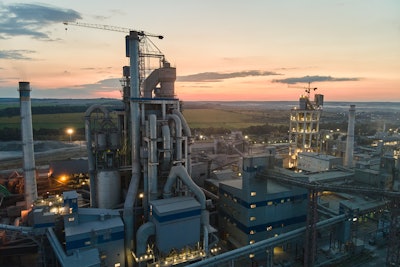
The cement industry is a vital pillar of the global construction sector and the foundation of the world’s infrastructure. Yet, in an era defined by technological advancement, shouldn’t this essential industry have access to the most powerful tools and resources available? Enter the transformative power of digital management platforms, artificial intelligence (AI)-driven analytics, predictive modeling, and precision measurement technologies.
From cement production plants to commercial concrete contractors, every stage of the process requires accuracy. From the precise blending of raw materials to the critical timing and environment of every pour, a miscalculation of even a single degree or one cubic yard can derail an entire project and budget. Costing your team time, money, and credibility. Thanks to cutting-edge digital tools, the margin for error is shrinking. These digital solutions have the ability to streamline cement and concrete companies to optimize mix designs, improve scheduling, monitor equipment availability, and leverage predictive analytics to avoid costly delays.
AI's Role in the Cement Industry
AI is increasingly being adopted in cement manufacturing to optimize operations. For instance, Anhui Conch Cement (a major supplier in mainland China), in collaboration with Huawei, developed an AI model that offers real-time recommendations for key quality features, predicting three-day and 28-day clinker strength with over 85 percent accuracy. This system also reduces kiln fuel consumption and enhances equipment monitoring and staff safety. Similarly, companies like Holcim are integrating AI-based software to multiple production plants, utilizing predictive maintenance solutions to improve operational efficiency too.
 Linarc
Linarc
In addition to AI-driven analytics, predictive forecasting empowers companies to proactively mitigate the impacts of natural disasters and streamline equipment scheduling with greater confidence and control. Imagine knowing a significant storm is approaching and adjusting your pour schedules in advance to avoid costly delays. These technologies not only enhance precision but also reduce operational costs, improve sustainability, and foster seamless collaboration, ensuring that every stakeholder is connected at every stage of the project.
Driving Sustainability & Efficiency Through Digital Innovation
Beyond risk mitigation and schedule efficiencies, digital platforms equip cement and concrete companies with powerful tools to better manage time, materials, and resources across every project phase. With real-time insights into inventory levels, delivery schedules, and material usage, companies can reduce waste, avoid shortages, and keep projects on track.
Integrated change order management helps minimize costly disruptions by streamlining approvals and updating schedules instantly. Meanwhile, equipment scheduling features ensure the right machinery is available when and where it’s needed, maximizing uptime and productivity.
These digital solutions also support sustainability efforts by optimizing material use, reducing carbon footprints through smarter logistics, and enabling better tracking of environmental performance. By uniting these capabilities in a single platform, digital tools empower cement companies to work smarter, faster, and more responsibly maintaining control over costs, timelines, quality, and environmental impact.
Advancements in Construction Management
Cloud-based construction management platforms that enhance collaboration among general contractors, trade contractors, and owners/developers have traditionally been geared toward large enterprise firms, due to the high costs and complex feature sets associated with them.
While large firms invest six figures in leading platforms, there are construction management software companies that offer customization, flexible scalability, and enterprise-level capabilities at a fraction of the cost.
Small to midsize contractors can find power features such as real-time scheduling and communication, resource allocation, crew assignments, and materials management, all accessible from anywhere and without a prohibitive price tag. Modern solutions are now built to grow and scale with contractors — providing the tools needed to stay competitive, efficient, and connected, without sacrificing affordability.
Embracing the Digital Future
As the cement industry increasingly embraces digital transformation; leveraging AI-powered insights and advanced construction management technologies; it is fundamentally reshaping expectations around quality, efficiency, and profitability. These innovations are not just enhancing operational workflows but are also setting new benchmarks across the sector. These tools are becoming essential for cement companies striving to stay competitive in an increasingly complex, fast-paced construction landscape. By embracing digital innovation solutions, companies of all sizes are unlocking new levels of precision, efficiency, and sustainability across every stage of the construction process without breaking the bank.
From AI-powered analytics that optimize pour schedules and predict material costs, to cloud-based platforms that streamline scheduling, resource allocation, equipment management, and change order workflows, digital tools are helping companies reduce waste, avoid costly delays, and make smarter, data-driven decisions. These technologies not only improve project outcomes and profitability, they also enhance collaboration among contractors, cement subcontractors, designers, and developers, ensuring every stakeholder stays connected and informed at all times.





